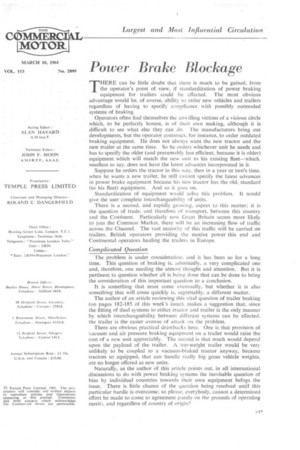Power Brake Blockage
Page 53

If you've noticed an error in this article please click here to report it so we can fix it.
THERE' can be little doubt that there is much to be gained, from the operator's. point of view, if standardization of power braking . equipment for trailers could be effected. The most obvious advantage would be, of course, ability to order new vehicles and trailers regardless of having to specify compliance with possibly outmoded systems of braking.
.• Operators often find themselves the unwilling victims of a vicious circle which, to be perfectly honest, is of their own making, although it is difficult to see what else they can do. The manufacturers bring out developments, but the operator continues, for instance, to order outdated braking equipment. He does not always want the new tractor and the new trailer at the same .time. So he orders whichever unit he needs and has to specify the older (and presumably less efficient, because it is older) equipment which will match the new unit to his existing fleet—which, needless to say, does not have the latest advances incorporated in it.
Suppose he orders the tractor in this way, then in a year or two's time, when he wants a new trailer, he still cannot specify the latest advances in power brake equipment because his new tractor has the old, standard (to his fleet) equipment. And so it goes on.
Standardization of equipment would solve this problem. It would give the user complete interchangeability of units.
There is a second, and rapidly growing, aspect to this matter; it is the question of trade, and therefore of transport, between this country and the Continent. Particularly now Great Britain seems more likely to join the Common Market, there will be an increasing flow of traffic across the Channel. The vast majority of this traffic will be carried on trailers, British operators providing the motive power this end and Continental operators hauling the trailers in Europe.
Complicated Question
The problem is under consideration, and it has been so for a long time. This question of braking is, admittedly, a very complicated one and, therefore, one needing the utmost thought and attention. But it is pertinent to question whether all is being done that can be done to bring the consideration of this important question to a conclusion.
It is something that must come eventually, but whether it is also something that will come quickly is, regrettably, a different matter.
The author of an article reviewing this vital question of trailer braking (on pages 182-185 of this week's issue), makes a suggestion that, since the fitting of dual systems to either tractor and trailer is the only manner by which interchangeability between different systems can be effected, the trailer is the easier avenue of attack on the problem.
There are obvious practical drawbacks here. One is that provision of vacuum and air pressure braking equipment on a trailer would raise the cost of a new unit appreciably. The second is that much would depend upon the payload of the trailer. A top-weight trailer would be very unlikely to be coupled to a vacuum-braked tractor anyway, because tractors so equipped, that can handle really big gross vehicle weights, are no longer offered as new units.
Naturally, as the author of this article points out, in all international discussions to do with power braking systems the inevitable question of bias by individual countries . towards their own equipment befogs the issue. There is little chance of the question being resolved until this particular hurdle is overcome; so please, everybody, cannot a determined effort be made to come to agreement purely on the grounds of operating merits., and regardless of country of origin?












































































































































